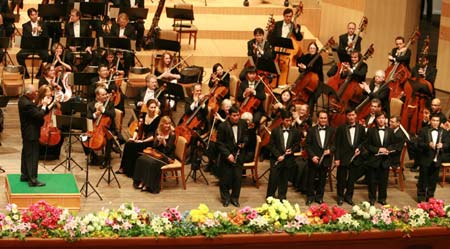The United States downplayed on Tuesday the impact of the performance by the New York Philharmonic in the Democratic People's Republic of Korea (DPRK), saying it was simply "a concert."
"The president thinks that, at the end of the day, this is a concert," White House spokeswoman Dana Perino told reporters after the oldest American symphony orchestra played in Pyongyang earlier in the day.

Members of the New York Philharmonic cooperate with musicians of the Democratic People's Republic of Korea (DPRK) during a rehearsal concert at the East Pyongyang Grand Theatre in Pyongyang, capital of the DPRK, Feb. 26, 2008. Over 1,500 people heard the rehearsal concert. (Xinhua/Xia Yu)
Perino noted that the unprecedented orchestra performance is not likely to change Pyongyang's stand on nuclear issues.
"It's not necessarily going to change the behavior of a regime that has not been as forthcoming as we need them to be on their nuclear activities," the spokeswoman said.
The New York Philharmonic arrived in Pyongyang Monday for a three-day visit which was agreed upon last year when efforts to end the DPRK's nuclear weapons program were making unprecedented progress.
The concert by the New York Philharmonic is widely seen as the first cultural exchange event in decades aimed at building mutual trust and understanding between the DPRK and the United States.

Members of the New York Philharmonic applaud for the performance of DPRK musicians during a rehearsal concert at the East Pyongyang Grand Theatre in Pyongyang, capital of DPRK, Feb. 26, 2008. Over 1,500 people heard the rehearsal concert.(Xinhua/Xia Yu)
However, in her brief comment on the performance, Perino reiterated the United States call for the DPRK to fully disclose its nuclear programs, saying "We need them to move faster on denuclearization, we need a full and accurate report from them and we also need a report on all their proliferation activities....
"What is the condition for future engagement with North Korea is for them to meet their six-party obligations.
"(If) they don't meet their six party obligations, all sorts of things won't happen like increased communication, increased economic development, increased trade, increased cultural exchanges, all of the things that many other countries in the world enjoy because they are not suffocating their own people," she said.
Under an agreement reached in October 2007 at the six party talks, the DPRK agreed to disable its key nuclear facilities at the Yongbyon complex, and to declare all other nuclear programs by the end of the year.
The six parties refers to the United States, the DPRK, China, South Korea, Japan and Russia.
The DPRK has denied that it had missed the deadline to submit that declaration, saying "other participating nations delay the fulfillment of their commitments, the DPRK is compelled to adjust the tempo of the disablement of some nuclear facilities on the principle of 'action for action'."
(Xinhua News Agency February 23, 2008)